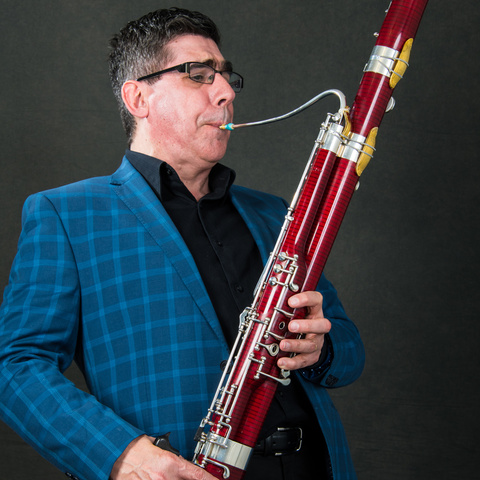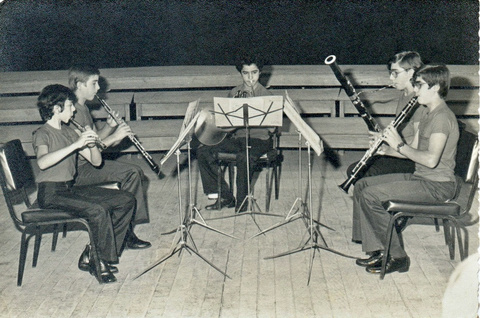
Benjamin Coelho is a University of Iowa professor of bassoon and an International Programs International Travel Award winner. He grew up in a musical family in what is now known as Brazil's "City of Music" and credits much of his musical beginnings to his father. We caught up with Coelho as he was preparing to leave for a trip to his native Brazil to teach and perform at the Festival de Música de Santa Catarina (FEMUSC) and celebrate his father's 88th birthday.
Tell us a little bit about yourself.
I grew up in a small city in Brazil called Tatuí, a city outside of São Paulo. It was mostly an agriculture-based town with some industry, but not a lot. Although São Paulo was the wealthiest state in Brazil, it had just one public conservatory, and that was where my father was the director.
My father was a trained musician. He took flute lessons but didn't have a degree in music. His family farmed. He would go by train to São Paulo carrying eggs to pay for his lessons. He was so interested in music that the owners of a local cotton factory wanted the employees' kids to learn music. They heard about my father and hired him to start a band for the employees' kids. He taught every instrument in the band.

The conservatory already existed in the town but only had piano and voice – more like a finishing school. The secretary of culture of the state of São Paulo sent musicians to the city to assess the conservatory as they thought of shutting it down. They met my father and were impressed with his work with the children and recommended that my dad get involved with the conservatory. Overnight it became a conservatory that had a band.
I entered the conservatory when I was eight years old and spent entire afternoons and evenings at the conservatory as public schools only ran for half days.
After my years in the conservatory, I went to the State University of New York (SUNY) at Purchase to pursue my undergraduate education, where my two older brothers were also studying. I didn't speak English, and SUNY didn't require a TOEFL exam at the time. The American consulate wouldn't issue me a student visa due to my lack of English skills, but my brother convinced the officer to approve the visa.
We Brazilians, when we're given a chance, we embrace the opportunity. I graduated in three and a half years, while most students took up to five years to finish their degree. My life was studying and working, and I graduated with honors.
I went to the Manhattan School of Music for my master's degree. I went back to Brazil and worked as an orchestral musician in Rio de Janeiro at the Municipal Theater, and then I got a teaching job in Belo Horizonte, my dream job. I stayed there for seven years and returned to the U.S. to do a DMA program at Indiana University, but I didn't finish because I got a job here in Iowa. I've been in Iowa now for 25 years.
"What is most important to me is cultivating the human side of relationships. I refuse to think that what I have with my students is simply a business transaction."
Why did you choose the bassoon?
I joined the conservatory at age eight and started playing the recorder, and when I was 10, it was time to change instruments. Initially, I wanted to play the guitar, but my brothers told me I needed to play a band or orchestral instrument. So, I picked the bassoon because I had two cousins who played bassoons at the conservatory.
My first teacher was from Austria. He kicked me out because, in his opinion, I was too young to play the bassoon. Traditionally one needed to be 14 to start the bassoon. My father encouraged me to tell my teacher that I wanted this instrument. He agreed, but I had to observe other students' lessons first. However, my cousins were generous and let me use their instruments to practice. A new teacher showed up and was so nurturing. I was shorter than the bassoon, my right hand couldn't properly close the holes, and he was calm and loving toward me. I consider him to be my true first teacher.
You were the recipient of an International Programs International Travel Award. Can you tell us what the award was used for, and how it contributed to your academic/professional goals?
I often go to Latin America, but this was my first time in Guatemala. The grant made it possible for me to go there and create strong relationships. The Festival del Fagot Guatemala, or Guatemala Bassoon Festival, brought together young bassoonists from Guatemala, El Salvador, and Honduras, giving them the opportunity to showcase their talent and dedication to their music-making. I participated as a guest artist, performer, and teacher at the festival and as an adjudicator at the First Bassoon Competition Fernando Sosa. As we are looking to continue to diversify our student body, my participation in this festival opens pathways for recruiting Latin American musicians.
You said that participating in events such as the Festival del Fagot Guatemala can support the diversification efforts at the University of Iowa. Can you expand upon that?
The U.S. has been a leader in DEI efforts in the last few years, and more and more people are willing to address these serious issues. This comes with a lot of growing pains. Generally, students from Latin America see music as a viable profession that can help them escape poverty. They have talent and dedication and see the U.S. as a place where they can develop more and see a brighter future.
Classical music is very white in the U.S.; it's not so white in Latin America. Latin American musicians have an excellent work ethic; however, the English requirement and lack of money are significant impediments to coming to the U.S. If given the chance and opportunity with scholarships or fellowships, they would undoubtedly succeed here.
What are you most proud of?
What stands out are the relationships that I forge with my students here at Iowa. I have high standards for my students, and I am not the kind of teacher who spoon-feeds the information to them. Instead, my style is to help them discover their creativity and own path, even if they aren't progressing as quickly. The feedback I get from my students after they graduate is how grateful they are for my teaching style.
What is most important to me is cultivating the human side of relationships. I refuse to think that what I have with my students is simply a business transaction. My goal is to help them evaluate what path they will take when they come to a bifurcation or a challenge. Not all bassoon students are here to become professional musicians. They have different interests and are exploring the many ways to develop their minds through a liberal arts education.
Learn more about faculty funding opportunities
International Programs (IP) at the University of Iowa (UI) is committed to enriching the global experience of UI students, faculty, staff, and the general public by leading efforts to promote internationally oriented teaching, research, creative work, and community engagement. IP provides support for international students and scholars, administers scholarships and assistance for students who study, intern, or do research abroad, and provides funding opportunities and grant-writing assistance for faculty engaged in international research. IP shares their stories through various media, and by hosting multiple public engagement activities each year.